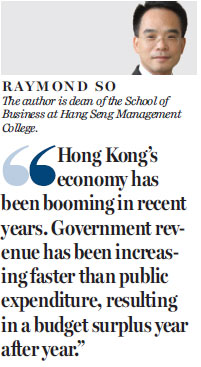Reserve funds can be used for long-term public financial planning
Updated: 2016-02-25 08:29
By Raymond so(HK Edition)
|
|||||||||
Financial Secretary John Tsang Chun-wah's annual budget speech used to attract much attention from the media and the public. But it may not attract as much attention this time. This is probably because there have been many dramatic developments in Hong Kong in recent weeks. A lot of attention has diverted toward those incidents. To be fair, we probably should not expect a lot of new ideas in the Budget each year. After all, it is an annual exercise with public concerns mainly focused on how many benefits the government will hand out. Also, it is not an easy task to think of new ways to manage the public finances. It is natural for people to focus on how many tax rebates the government will offer. To the average taxpayer the budget is not about the government's philosophy of managing public finances, it is all about handouts, such as tax rebates and allowances.
In this regard, the Budget is like the announcement of the results of a listed company. The tax rebate is like a dividend payment. The public simply has the mentality of minority shareholders, who are only concerned with immediate benefits. Long-term financial arrangements often go unnoticed.
It is not fair to say that the government is doing nothing or is doing badly in regard to financial management. In Hong Kong, the Budget always provides a great challenge when it comes to long-term financial planning, especially considering Hong Kong is a special administrative region (SAR). The Basic Law requires the SAR government to spend within its means, which is a major constraint in our public finances. The government needs to consider both revenue and expenditure in formulating the Budget or it is violating the Basic Law. It is true that an occasional deficit is tolerated; however, spending within one's means will generally result in a budget surplus. In the formulation of the Basic Law, this requirement had its own rationale. As an SAR, which enjoys a high degree of autonomy, Hong Kong must maintain financial self-sufficiency. Such autonomy will be extremely difficult to maintain if Hong Kong is not financially self-sufficient.
This part of the Basic Law also means increases in spending should be based on income growth. However, it is easier to forecast a growth in spending than a growth in income. Thus there is a natural tendency to be cautious when planning any increases in spending.
Hong Kong's economy has been booming in recent years. Government revenue has been increasing faster than public expenditure, resulting in a budget surplus year after year. But increases in revenue are not guaranteed because government revenue ultimately depends on the economy's performance, which is often exposed to external economic conditions. Faced with uncertainty on revenue, the government used to spend the surplus through "one-off" tax rebates and cash handouts. But such exercises failed to live up to their "one-off" promise. They became more routine in recent years. Now people habitually expect tax rebates no matter what the market conditions are.
In fact, given Hong Kong's strong financial fundamentals, the tax rebates are just redistributing wealth to society from the government's surplus. But this practice is not without its detractors. To deal with the future challenges in Hong Kong, a possible option for public financial planning would be to establish reserve funds earmarked for special purposes.
The Housing Reserve Fund is a good example. As we all know, there is a serious housing problem in Hong Kong. The number of people waiting for public housing far exceeds the number of public housing units being built. One of the key factors for tackling the housing problems is the availability of financial resources for building public housing. The Housing Reserve Fund has accumulated more than HK$70 billion. It generates interest incomes which can be used to meet the financial needs of future public housing development. With this supplementary financial resource, the government will be faced with less financial pressure in the future. And if only interest incomes will be withdrawn, the fund can operate continuously. By applying this model, we can set up many different funds for different purposes.
Of course, there is an important assumption behind this financial arrangement that the relevant projects can use only the interest incomes from the earmarked reserve funds; otherwise it will be difficult to implement this model in a sustainable way. It also requires considerable planning to determine the right size of the funds. It also means that the government should inject money quite substantially into these reserve funds.
The government has established a range of such funds, but in some of its most controversial projects it would not dare to adopt a similar financing model. Improving funding arrangements for earmarked reserve funds could be a way to solve this problem.

(HK Edition 02/25/2016 page5)